|
|
|
Sort Order |
|
|
|
Items / Page
|
|
|
|
|
|
|
| Srl | Item |
| 1 |
ID:
080870
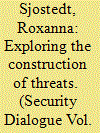

|
|
|
|
|
| Publication |
2008.
|
| Summary/Abstract |
In April 2006, Russian President Vladimir Putin publicly declared HIV/AIDS to be a threat to Russia's national security and proposed a guiding strategy to handle it. This move stood in sharp contrast to previous policies of the Russian government. Despite the fact that Russia has experienced one of the fastest growing rates of HIV/AIDS in the world since the turn of the millennium, the government's involvement had previously been minimal, not recognizing AIDS as a national security threat. The question then arises: when is a threat really threatening? This article contributes to the development of theories on threat-framing and security decisionmaking by suggesting an analytical framework that incorporates explanatory variables from different levels of analysis. The adoption of a broad theoretical position facilitates a comprehensive understanding of time and space variations in the securitization of issues. The article demonstrates that norms and identity constructions at the international and domestic levels, combined with their internalization by individual decisionmakers, can together explain Putin's move, and that these factors are of different importance at difference stages of the threat-construction process
|
|
|
|
|
|
|
|
|
|
|
|
|
|
|
|
| 2 |
ID:
115326


|
|
|
|
|
| Publication |
2012.
|
| Summary/Abstract |
This article investigates the performance of Poland and the Czech Republic in the US-led regime change wars in Iraq and Afghanistan. The article indicates a significant gap between the Czech and Polish discourses and practices related to the two countries' contributions. In the two crises, discourses revolved around the notion of universal values and support for legal and legitimate peace support operations mandated by the UN. But the practices did not match those discourses and were actually driven by the beliefs that form the Atlanticist ideology. The article analyses the successful internalization of US discourses and threat perception in Poland and the Czech Republic through the use of 'cascade argumentation'. The practical results of this internalization are then examined.
|
|
|
|
|
|
|
|
|
|
|
|
|
|
|
|
| 3 |
ID:
119234
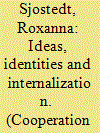

|
|
|
|
|
| Publication |
2013.
|
| Summary/Abstract |
Why do some events take precedence over others in terms of being viewed as security issues? This article argues that in order to answer this question it is necessary to move beyond the assumption that threat images are self-evident. Rather, a distinction should be made between the contextual conditions that may lay the foundation for a threat image and the subjective problem formulation by actors. In addition, in order to analyze how, why, and when an actor constructs a threat image and initiates a so-called securitization process, a broad conceptual and analytical framework should be employed. This article suggests a framework that incorporates ideas and identity at the international and domestic levels, and the internalization processes of the central decision-making unit performing the securitization. The article argues that while the diffusion of ideas by entrepreneurs forms an important basis for the threat constructions of national decision-makers, it is necessary to take the role of national and domestic identities into account in order to explain why some idea diffusion processes succeed while other do not. Identity serves as a catalyst or gate-keeper of idea diffusion. The internalization of the decision-making unit, finally, is a central mechanism that highlights the process between the explanatory factors and the outcome (securitization). By including these three concepts into the analysis, this article takes a holistic approach that can be employed to analyze different kinds of actor-based and non-actor-based threat images.
|
|
|
|
|
|
|
|
|
|
|
|
|
|
|
|
| 4 |
ID:
121187
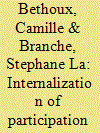

|
|
|
| 5 |
ID:
094698
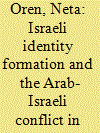

|
|
|
|
|
| Publication |
2010.
|
| Summary/Abstract |
This study focuses on the relationship between national identity and intractable conflict. Abdelal's definition of collective identity that refers to the level of agreement regarding the purposes, practices, relational comparisons with other entities, and narratives that define collective identity was adapted to national identity during intractable conflict and was later applied to Israel's national identity. A review of the Israeli 1969-2006 election platforms shows that in the 1980s and 1990s significant changes occurred in Israel's national identity. The most significant changes included: changes regarding the territorial purpose of Israeli identity; changes in practices on who may become an Israeli citizen; changes of perception of the relationship between Israel and the Arabs; and a growing Israeli acceptance of Palestinian identity. Since 2000, following the failure of the Israeli-Palestinian peace process, some components of Israeli national identity have reverted to their original form. The study indicates that the Arab-Israeli conflict triggered changes in Israel's national identity, but the conflict also seemed affected by changes in that identity. The article connects the changes in Israeli national identity to specific mechanisms and conditions of conflict resolution and reconciliation.
|
|
|
|
|
|
|
|
|
|
|
|
|
|
|
|
| 6 |
ID:
135069


|
|
|
|
|
| Summary/Abstract |
With the Gulf War as a trigger, Japan began to make a humanitarian contribution by dispatching the Self Defense Forces to United Nations peacekeeping operations. Given Japan's strong hesitation for participation in the past, Japan's peacekeeping policy presents an intriguing challenge to examine the factors for a preference change and sustained compliance. By investigating Japan's peacekeeping policies towards East Timor and Haiti, this article examines how Japan's behavior and preferences were influenced by either internalized norms or cost/benefit calculations. While norm-driven behavior is considered to be incompatible with strategic calculated behavior, the article demonstrates that these two factors can co-exist.
|
|
|
|
|
|
|
|
|
|
|
|
|
|
|
|
| 7 |
ID:
088114
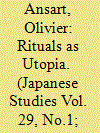

|
|
|
|
|
| Publication |
2009.
|
| Summary/Abstract |
Ogyu Sorai's eighteenth-century theory of rituals pushed to an unsettling conclusion the assumption made popular by many contemporary authors that internalization of social norms is better achieved through the subtle control of bodies and gestures than through coercion, threats or argumentation. Because Sorai's rituals aimed at shaping in everyday life, according to pre-determined status, body gestures, utterances, and all the objects surrounding the body, from clothes to houses, furniture and conveyances, they would have transformed life into a performance of a scripted play. They would also have represented the ideal and absolute form of authority, following Hannah Arendt's famous definition of the concept as that which elicits obedience or conformity without need for coercion or argument. The fluidity inherent in the urban life of Tokugawa Japan, however, made sure that Sorai's utopia would remain just that - and probably explains why Arendt found authority so elusive in our modern societies
|
|
|
|
|
|
|
|
|
|
|
|
|
|
|
|
|
|
|
|
|